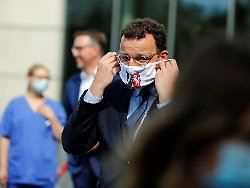At the beginning of the pandemic, speed was required and masks were needed. Today it is clear: In the panic, there were too many and too expensive contracts. The damage is immense. According to "Capital", however, the federal government can subsequently take action against the prices called up.
When the state places orders, it is seldom spectacular. But in the case of the mass purchase of masks and other protective equipment in the Corona crisis, it is different: it provides enough material for a crime thriller. At first, at the beginning of the pandemic, the federal government had far too few protective masks for medical staff. After an unprecedented shopping offensive led by Health Minister Jens Spahn (CDU), he is now sitting on far too many. For months, the Ministry of Health has therefore been trying to get a grip on an order process that has gotten completely out of control with the help of external consultants. Spahn's masked crime thriller, which now also employs several courts and armies of lawyers, has long been concerned with more than billions. It is also about the question of whether the state can simply override the rules for contracts in a pandemic – and what contracts with the state are worth.
According to the Ministry of Health, the federal government has procured around three billion protective masks since March, when protective masks were suddenly scarce and highly competitive worldwide. He relied on various procurement channels – from direct contracts with suppliers to the support of German groups such as VW and BASF, which have good purchasing networks in China, to a special order process with hundreds of suppliers. The order volume behind the roughly three billion masks, according to Spahn's department: a "mid single-digit billion amount".
In addition, at the end of March, the Ministry of Health commissioned a central logistics service provider to buy masks: the Fiege company. For the federal government, the logistics company from Spahn's neighboring constituency in Münsterland managed the air transport of protective equipment from China to Germany and took on the storage and distribution of the masks to the federal states and the associations of statutory health insurance physicians in Germany. At the request of Capital, the ministry confirmed that the order to Fiege was placed without a tender because of the urgency. It put the previous expenditure on logistics at a "low three-digit million amount".
Fiege also played a role as the central logistics service provider in the so-called open-house process that is at the center of criticism of Spahn's purchasing management. In this special order process alone, the federal government awarded 738 mask suppliers at the beginning of April, who had to deliver their goods to a central Fiege warehouse near Erfurt at the end of April. Total bid volume: around 6.4 billion euros.
In the case of an open-house procedure, all contractors who state that they can meet certain contract conditions and minimum quantities are awarded a contract. For the state, such an award procedure has the advantage that it goes quickly, which Spahn and his consultants in the spring considered to be urgent due to the "blatant shortage of goods on the international market and the rapidly deteriorating global crisis situation". The disadvantage of an open-house procedure is that it is difficult to calculate in advance how many suppliers are participating and with what quantities. A key factor for this: the price. In this case, the Ministry of Health guaranteed its suppliers EUR 4.50 net per mask in protection classes FFP2 and FFP3 at the beginning of April for a delivery of at least 25,000 pieces on a fixed date – a price that obviously led to the federal government being overrun by contractors and that the initial surcharges significantly exceeded the planned budget for this procurement process.
Massive drop in the price of masks
But after the price spikes due to the worldwide explosion in demand for protective equipment at the beginning of the pandemic in spring, the market situation has long since eased significantly. For months now, FFP2 masks have been available in China for less than one euro each. Procurement law experts such as the Hanau lawyer Harald Nickel are therefore calling on the federal government to retrospectively review the price of 4.50 net per FFP2 protective mask promised in the open house process.
Nickel refers to an ordinance with the bulky designation “Ordinance PR No. 30/53 on the prices of public contracts”, according to which the legally permissible prices may not be exceeded in the case of government contracts for market services. "The price regulation is intended to protect the state from exploitation, especially in the event of delivery bottlenecks, for example under special conditions in the event of a pandemic," said Nickel. "It is therefore advisable that the price authorities review the agreed prices to ensure that the federal government does not suffer any financial damage." The price authority of the federal state in which a contractor is based is usually responsible for the check.
The article was published on September 16 by Capital.de.
Note from the ntv.de editors: Many dealers and suppliers are still waiting for payments from the ministry – 55 lawsuits have already been filed in the matter before the regional court in Bonn. According to information from ntv, the first hearing will take place on September 25th.
. (tagsToTranslate) Economy (t) Jens Spahn (t) Mask requirement (t) Health policy
